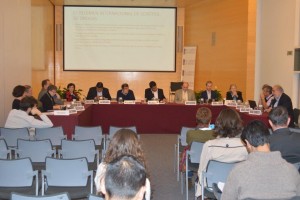I am just coming to the end of a fascinating and sobering three-week stay at Colegio de Mexico (COLMEX), courtesy of the British Academy’s Newton Mobility Grants scheme, to advance research on transnational narcotics governance in collaboration with my colleague Professor Monica Serrano, one of the leading authorities on drug policy in Latin America. As part of the grant, on 14 January we hosted a workshop on the relationship between the International Drug Control Regime and the International Human Rights Regime and its implications for drug policy in Mexico and the region.
The workshop drew on the expertise of leading academics and policy experts in Mexico to evaluate the tensions and contradictions between the International Drug Control Regime and the International Human Rights Regime in light of current events in Mexico’s ongoing crisis of massive criminal violence in the context of drug-trafficking. In collaboration with COLMEX’s Centre for International Studies and Director, Professor Ana Covarrubias, we convened some of the leading scholars and policy-makers in the field (programme here), who between them offered an extraordinary sweep of the historical and contemporary panorama of drug policy and human rights in Mexico, with interventions on regime tensions, civil-military relations, violence and drug policy, and its impact on already fragile state institutions.
 After decades of massive investment in regional securitisation of drug control policy, there is little sign of success and the human rights toll is now well-documented. As policy is revisited at the national level, we felt that this was an opportune moment to reflect on the limitations of existing approaches and the potential for a fundamental reorientation towards a more effective and legitimate governance model – one which establishes human rights protection as a guiding expectation in elaborating core governance objectives.
After decades of massive investment in regional securitisation of drug control policy, there is little sign of success and the human rights toll is now well-documented. As policy is revisited at the national level, we felt that this was an opportune moment to reflect on the limitations of existing approaches and the potential for a fundamental reorientation towards a more effective and legitimate governance model – one which establishes human rights protection as a guiding expectation in elaborating core governance objectives.
Among many valuable reflections over the course of the day, it also became clear that there is an important role for dedicated scholars in this field, alongside journalists, human rights activists and policy experts, to produce better actionable information on the political ecology of drug-trafficking and its violence-producing pathologies. In particular, identification of key responsible actors, mapping material and ideational linkages across state, society and private illicit actors, and spotlighting structural contributing factors are all key to advancing policy prescriptions which can break with “business as usual”. Crucial to this also will be to support a courageous Mexican civil society to establish new forms of legitimate authority. Without underestimating the scale of the challenge, it is also important to focus not only on the big changes, but also the small incremental actions of pro-reform accountability actors, which in combination may serve to advance progressive change.
It is perhaps surprising, in light of the urgency of the situation, that the human rights and drug policy community – both in policy and academic circles – has rarely engaged in serious dialogue. The workshop was a substantive contribution to opening up that discussion to identify the potential for productive engagement. We look forward to welcoming Monica Serrano to UCL in June 2016 for a follow-up workshop, hosted by the Institute of the Americas and the Global Governance Institute, in light of a UN General Assembly special review on the drug control system scheduled for April 2016.
